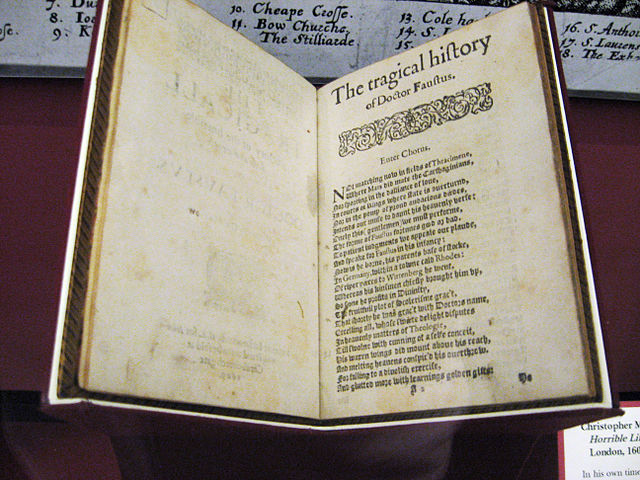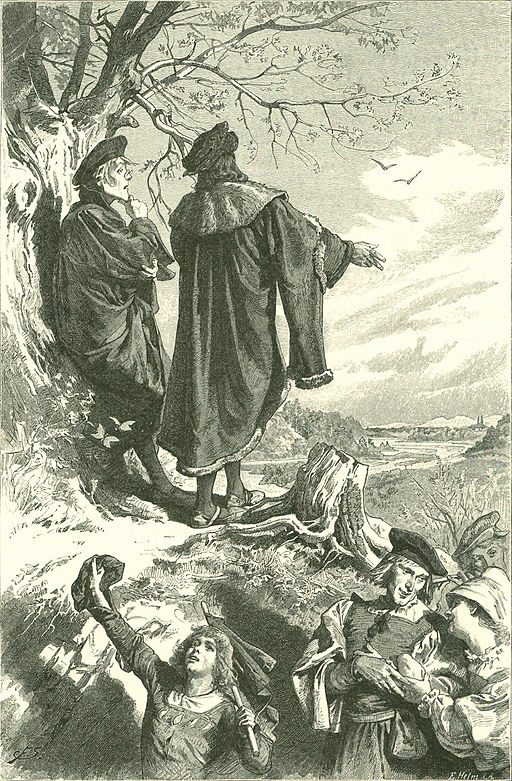I finished reading the complete Faust by Goethe just a few days ago. However, this post is not about what I thought of the book, but about the train of thoughts it set off inside my head. About Faustian bargains and how we are surrounded by them in our lives.
I then discovered that all the variations on the Faust theme have the same origin. And that all the literary, musical, theatrical and cinematic renditions of it have been inspired by one another in some way. It all begins with an old Germanic and West European legend, of a certain Johann Georg Faust.

He was known – variously, in different versions of the legend – as an astrologer, alchemist, sorcerer and magician. He wielded sufficient powers. But, unhappy with his knowledge and power, he strikes a bargain with the devil, Mephistopheles, and agrees to give up his soul to eternal damnation in return for greater worldly pleasures and power. Along the way, Gretchen is a woman who Faust seduces and she is condemned to hell, because she gives birth to an illegitimate child. It is a story that signifies the moral corruption of man and his fall. Damnation awaits Faust too, needless to say.
♠
The first edition of this German legend from the Renaissance era was a chapbook published in 1587 under the title, Historia and Tale of Doctor Johannes Faustus. The more famous literary renditions are, of course, Christopher Marlowe’s The Tragical History of Doctor Faustus, Goethe’s Faust and Thomas Mann’s Doctor Faustus. Christopher Marlowe was clearly inspired by the first published legend and wrote his tragedy rendition which was published in 1600. In it, Faustus strikes the deal with Mephistopheles, while in Goethe’s version, it is not Faustus who suggests the wager, but the devil, Mephistopheles.

Also, since Goethe didn’t live to complete Faust, the second part of his tragedy was completed posthumously. Written as a play, but in verse form, it is the most wonderful and lyrical exposition of man’s flaws and beauty at the same time. However, one wonders if he would have wished to see Faust redeemed in the end, as indeed he is. Margaret, the woman wronged, is condemned and saved. However, in the second part of the tragedy, when it is time for Faust to give up his soul and be damned, after his seduction of Helen of Troy, he is saved by earthly spirits and angels. It is women who come to his rescue.

Thomas Mann who wrote his Doctor Faustus in the time of the rise of Nazism, set it in the political context of a Germany at war with its own soul. In his construct, Faust was a stand-in for the soul of his country. It was an allegorical re-telling of the old Faust legend, but one that doesn’t even have Faust as a character, except in the cantata, The Lamentation of Doctor Faustus, that the main protagonist and music composer, Leverkuhn, is writing. At the first performance of the cantata, Leverkuhn collapses at his piano and lives out the remaining 10 years of his life in dementia. No story of redemption here.
♠
If we think about it, Faustian bargains are everywhere we look. In this century alone, we have had a fair share of them. Think the art of the deal.
However, Trump is not to blame for the financial crisis. He is only a symptom of the problem that won’t go away. He symbolizes the class of wealthy Fausts who struck a deal with ordinary unsuspecting homebuyers and other bankers, selling them out wholesale in CDOs (collateralised debt obligations), which they themselves didn’t understand. The rest is history that is still in the making and that we are still living through. Ordinary middle-class folk were collateral.
Let’s also remember the techies who went bust in the dotcom boom era at the turn of the millennium. Not to be put down, they came back from oblivion to reclaim their future – and ours – with a wave of technological innovations based on the internet. They were back with a vengeance. They struck a bargain that they will enrich our lives in all sorts of ways that we aren’t even aware of yet, if only we will give up our data, our privacy, our agency. We won’t even have to think intelligently. We have AI to do it for us. How about giving up some sovereignty over ourselves, in return for more leisure (and laziness) that we can now spend on social media with “friends”.
You’d think at least heads of governments would be worried, right? No way. They are too busy striking other more important deals with each other, and with their cronies at home. Towering and gleaming dreams in foreign capitals, buying and selling more arms (as if we don’t have enough already), colluding to get tough opponents out of the way. Including journalists, sometimes, as has happened in India as well.
In fact, like I wrote in my post on jobs and automation recently, I wouldn’t put it past governments to collude and make deals quietly with tech giants to not regulate the sector. To look the other way and to be quiet about any data privacy issues.
With all the arms making and selling, you wonder what chance we have of surviving. Well, we need it for our protection, we are told. These same leaders who pride themselves on striking deals are also the ones to walk away from them, especially when it is about our survival. Look at climate change and the future that awaits us and the next generation, if we don’t do something about it. Instead, there are some who want to strike bargains with coal mining and oil barons, in the mistaken hope that they will bring back more jobs. Hmm… if only they cared to read and watch less Fox TV, they might discover that it is the renewables industry that is generating more power (in US and Europe) and will be creating more jobs in future.
And what can we say about populist leaders who strike deals with their people to close borders, build walls and raise trade barriers as well, all in a wave of xenophobic, anti-immigration, anti-globalisation hysteria, instead of finding real and pragmatic ways to improve the lot of their citizens.
Brexit is just one example of how wrong things can go when a few special interest groups try to hijack the national agenda, taking the country to a perilous future, at a time when the world is still recovering from the financial crisis.
Then, of course, there are Faustian bargains being made all across the world every day. Deals that line the pockets of the rich and keep the poor, well, poor. Corporate results that are expected to meet analyst’s expectations quarter after quarter, so that stock values rise. And executive compensations, in tandem. It’s another matter that the job contract itself may not last longer than three years, if that.
At the end of the day, you realise that a Faustian bargain is essentially a trade-off. Trade away a little of long-term gain, for short-term gain. All the while, chipping away at our ability to really build capacity, to replenish our inner resources, to live richer and fuller lives.
A Faustian bargain works at the every day level of our mundane existence. And in the larger context of a nation’s or the world’s future.
♠
On a happier note, I will be sharing the link to an article on the pleasures of reading that I promised in appreciation for the responses that I received to the reader survey that I ran this month. That will be in a few days, so please do look out for my next post.




I do agree with all of the ideas you have presented in your post. They are really convincing and will certainly work. Still, the posts are very short for novices. Could you please extend them a bit from next time? Thanks for the post.
LikeLike